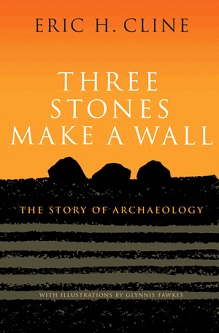Atlantis-Scout
Contents Overview



Eric H. Cline:
Surprisingly superficial treatment of Atlantis
Thorwald C. Franke
© April 2017

Book: Three Stones Make a Wall
In his book Three Stones Make a Wall – The Story of Archaeology, published March 2017, the renowned archaeologist Eric H. Cline dedicated one chapter of eleven pages length to the question of Thera / Santorini and Plato's Atlantis.
Cline expresses the opinion that the volcanic eruption of Thera / Santorini could be the historical kernel of the Atlantis story. Even though Cline leaves open whether this is really the case, his formulations clearly indicate that he indeed is inclined to this opinion. Cline underpins his opinion e.g. by a hint to the Egyptian "Tempest Stele".
Since Cline does not identify the island of Thera / Santorini with Atlantis as a real place, but sees it only as the historical background for a basically fictional account, this opinion is not a surprise. Somewhat more surprising is that Cline expresses the opinion that also "many other" archaeologists would share this opinion.

Eric H. Cline
Yet really remarkable is how superficially Cline treats Plato's Atlantis story! In his summarizing retelling of Plato's dialogues he makes many mistakes, and Cline omits many questions which inevitably come up. Some examples:
- Cline writes that the Atlantis story was handed down from Solon via his direct descendants, i.e. sons, grandchildren, etc., until Plato. This is not correct. Plato was no direct descendant of Solon, and the way of tradition is depicted differently by Plato. Furthermore, it is partly a literary fiction.
- Cline considers the localization of Atlantis in Plato's dialogues as vague. He sees this as one reason why Atlantis has been searched all over the world. Yet this is wrong, too! The alleged site of Atlantis was described very accurately by Plato, especially because of the mud which is said to be the remainder of the sunken island: It hindered sailing from the straits of Gibraltar into the Atlantic Ocean. There are other reasons why Atlantis can be searched at other places.
- Cline believes that natural geological formations fitting to the description of Atlantis cannot be Atlantis, because they are of natural origin. Yet this is wrong, too! According to Plato, the geology of Atlantis was formed by Poseidon, and thus from a modern perspective it is of course of natural origin.
- Cline also expects a "relationship" to Greek culture from Atlantis. Yet this is strange, too, since Plato depicts the Atlantean culture as "barbaric", i.e. not Greek. Only far-reaching trading relations can be expected.
- Concerning the 9000 years, Cline only says that 900 years would fit better. This may well be right, yet it is only a wish. Where is the viable justification?
- Cline mentions that Atlantis was bigger than Asia and Libya put together, and that Plato provided an accurate description with measurements. Yet Cline does not comment on this. What does he want to say with it? And how to conclude from Plato's details to the island of Santorini?
- Atlantis is described by Cline as a "mythical place invented by Plato". This is a self-contradiction. Since Plato presents his Atlantis story neither as myth nor as invention. It could be an invention but even then it still would be no myth but a falsified, deceitful historiography.
- Cline tells about the two excavators of Santorini, Spyridon Marinatos and Christos Doumas. Yet he leaves unmentioned their opposite opinions about Atlantis and their entanglements in the political circumstances.
- Cline does not explain why the volcanic eruption and the ash cloud or similar things are not mentioned in the Atlantis story. Also the Egyptian Tempest Stele mentioned by Cline does talk about the presumable ash cloud.
- Cline thinks that the volcanic eruption of Thera / Santorini is the background for the "whole" Atlantis story. Yet this cannot be, because what about e.g. the war of Atlantis against primeval Athens? Wouldn't it have made sense to talk besides Santorini also about the Sea Peoples wars or something similar, as did e.g. Rhys Carpenter?
Summary
Eric H. Cline put forward a legitimate point of view on the topic of Atlantis. Yet it has to be said that Cline failed on the topic of Atlantis. In order to do justice to this complex topic, Cline invested way too less depth of thought, and way too less research into which other scientists had put forward similar theses in a much more convincing way.
Web links
Literature
- Cline (2017): Eric H. Cline, Three Stones Make a Wall – The Story of Archaeology, Princeton University Press, Princeton / Oxford 2017.
- Carpenter (1966): Rhys Carpenter, Discontinuity in Greek Civilization – The J.H. Gray Lectures for 1965, Cambridge University Press, Cambridge 1966.
www.atlantis-scout.de
Contents Overview
COPYRIGHT © Apr 2017 Thorwald C. Franke
Legal Notice!





